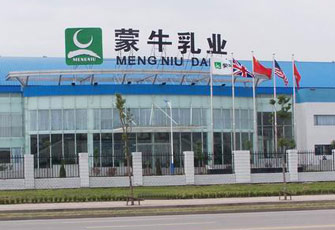On 11 June, Mengniu signed a cooperation agreement with Chengguan district
government (Lhasa City, Tibet Autonomous Region) to jointly construct dairy
farms and processing plant. The cooperation is part of the “Pure Land &
Health Industry” programme which the Lhasa government is promoting, aiming to
make full use of the local unique environment and rare resources to develop
pure and healthy specialty products. According to the agreement, Mengniu will
offer technical and management support in operating the farms and the plant.

Source: Baidu
The Lhasa government runs a 1,500 cow dairy farm currently and plans to
construct 4 high standard dairy farms this year; a processing plant next to the
farms is also being set up, and is due to be operational by the end of the year
(this involves an investment of nearly RMB200 million / USD30.4 million; 1st
phase: 50,000 t/a).
“Working through COFCO Corporation (COFCO)’s Tibet supporting team, we can
easily co-operate with Chengguan district,” stated Sun Yiping, CEO of Mengniu:
“After years of international business expansion and integration, we already
have a lot of resources and experience to offer.”
Guo Guo, Party Chief of Chengguan District, also attended the signing ceremony,
“Tibet is rich in resources. However, it has no largescale dairy farms. We are
very glad that Mengniu is here to work with us to establish local premium dairy
brands.”

Mengniu starts business activities in Tibet
Tibet is one of China's 5 pastoral areas (= Inner Mongolia, Ningxia, Xinjiang,
Qinghai and Tibet), with a resulting strong focus on pastoral farming.
However, the local dairy herd is very poor - mainly yellow cows with low yields.
There are many yaks, but these have a typical milking period of only 120 days,
and their dispersed distribution makes collection a challenge. Tibet’s dairy
industry, restricted by environment, capital and technology, has started late
and developed slowly, with the only real success being the brand “Treasure of
Plateau” used on a range of dairy products including infant formula.
The state of the industry locally is reflected in the deficient supply of dairy
products to local residents - Tibetans are mainly living on milk dregs,
shortenings and yoghurt. Early in 2012, the region's rural consumption per
capita of dairy products was 38.27 kg (the local statistics yearbook does not give
an equivalent urban figure).
Tibet's urban residents’ spend on dairy products
reached USD60.5 (RMB398.5) per capita, ranking 3rd in national terms,
reflecting the significance of dairy in the area's dietary intakes - there are
few vegetables available but lots of cows/yaks and sheep and even horse, making
meat and dairy products key food items locally. However, the limited milk
supply forces residents to buy products from other provinces such as Sichuan
and Qinghai.
In this context, it makes sense to develop the industry locally, and COFCO, an
SOE supporting Tibet’s development in other ways provides an opportunity for
Mengniu to participate. In 2015, Tibet had a GDP of USD15.6 billion (RMB102.6
billion), led by Lhasa at USD5.9 billion (RMB38.9 billion), making it the
obvious starting point. However dairying at this altitude will provide a
challenge even for Mengniu, given the prevalence of yaks locally.
This article comes from Dairy Products China News 1606, CCM

About CCM:
CCM is the
leading market intelligence provider for China’s agriculture, chemicals, food
& ingredients and life science markets. Founded in 2001, CCM offers a
range of data and content solutions, from price and trade data to industry
newsletters and customized market research reports. Our clients include Monsanto,
DuPont, Shell, Bayer, and Syngenta. CCM is a brand of Kcomber Inc.
For more
information about CCM, please visit www.cnchemicals.com or get in touch with us
directly by emailing econtact@cnchemicals.com or calling
+86-20-37616606.
Tag: Mengniu dairy